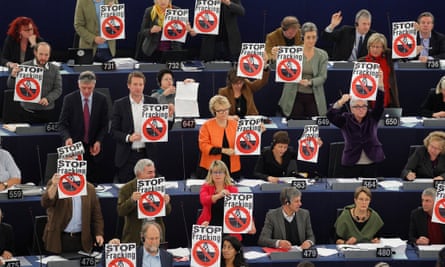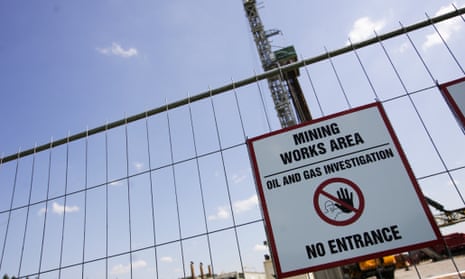Environmentalists have walked out of an influential EU shale gas group, which they say has been taken over by industry groups who are using it as a platform to promote fracking.
Advice from the expert panel on unconventional hydrocarbons is expected to inform the European commission’s future decisions on the exploration of shale gas in Europe, which the UK and Polish governments have strongly backed.
The panel is led by five chairmen; two executives from the shale firms Cuadrilla and ConocoPhillips, two officials from pro-shale ministries in UK and Poland, and a director of IFP Energies Nouvelles, who is also an advisor to the Shale Gas Europe lobby group.
These chairs oversee and approve the work of task forces drawn from an invite-only network. But less than 10 environmentalists were welcomed to the last meeting in February, compared to around 70 attendees who were largely from industry.
Friends of the Earth argues that the network’s ‘grey’ structure presents a clear conflict of interest for firms which hold patents in hydraulic fracturing technologies under discussion, and investments in the field more generally.
“The European commission is using public funds to provide a lobbying vehicle to the oil and gas industry”, said Antoine Simon, Friends of the Earth Europe’s shale gas campaigner. “We refuse to let the name of our organisation be used to greenwash an industry-driven initiative. This is why we have decided to pull out of this expert group.”
Commission officials maintain that the body is a non-advisory group aimed solely at providing a fair and balanced exchange of ideas. “It is necessary to continue increasing our knowledge on unconventional hydrocarbon extraction technologies and practices in order to further reduce potential health and environmental impacts and risks,” a commission spokesperson told the Guardian.
But panel chairmen openly say that the group’s intent is to prime future EU policy-making on shale gas. “From the prepared questions and collected knowledge, the European commission has to draw conclusions, which will form the basis for the decisions and legal system of the EU in the field of non-conventional hydrocarbons,” Grzegorz Pieńkowski, a director of the Polish Geological Institute told a Polish gas trade journal last month.
“It is believed that the European commission will base its future political decisions and regulations on the work of the advisory group,” he added.
The February meeting was preceded by a commission funding call for research into mitigating such environmental risks. Critics branded the scheme a fossil fuel subsidy because of the €113m (£82m) it offered for tasks that shale firms would otherwise have had to pay for themselves.
At the experts’ meeting in February, €11.6m of grants were announced for four studies into shale risks, such as induced seismicity, water supply contamination and fugitive methane release.
Beneficiaries of the awards included projects run by the University of Edinburgh and University College London, the latter with support from US fossil fuel firm, Halliburton.
The idea for the shale gas network originated in an EU Joint Research Centre meeting with industry representatives two years ago.
According to a report by the centre’s energy security unit, the network should “establish environmental baselines” for the EU. These would then be communicated to policymakers to inform their decisions. Some participants questioned whether civil society or the public sector should be allowed to take part in the network.

The last EU president, José Manuel Barroso, gave lead responsibility on shale gas to the bloc’s environment department (DG Environment), which was known to be sceptical about fracking.
The department reported that fracking posed a high-risk of contaminating and depleting ground and surface water, as well as degrading biodiversity, land, air quality and seismic conditions.
But a backstage push by DG Environment for a tough safety directive was blunted by the EU’s hierarchy. One court case the department launched against Poland for breaching its risk assessment obligations on shale drills remains a sore point in Warsaw though.
“The establishment of the advisory group is a step to reversing the course of unfavourable or suspicious attitudes about shale gas towards a more pragmatic and ultimately friendly direction,” Pieńkowski said.
There was no doubt that forthcoming tests would show that fears around fracking had been exaggerated, he said, adding that the commission’s environment department and Green NGOs were now weaker within the EU.
Friends of the Earth agreed that the balance of power was shifting in Brussels, citing an oral pledge from the commission that all sides of the shale debate would be represented in the expert group which, they claim, was not honoured.
“While a ‘science and technology network’ on unconventional fossil fuels sounds objective, it’s a complete façade – the European commission is giving the oil and gas industry all the seats at the top table,” Simon said. “Promises of balance have not been kept.
“With the dirty energy lobbyists clearly setting the agenda, no-one can take Europe’s climate ambition seriously,” added Pascoe Sabido, a spokesperson for the Corporate Europe Observatory watchdog which has joined the boycott. “There’s a serious question of whether the same corporations trashing the climate should be anywhere near our decision makers who have been tasked with saving it.”
In January, the European Parliament’s ombudsman, Emily O’Reilly, called for EU expert group members to be listed in the transparency register because of “the perceived imbalance in favour of corporate interests in certain groups and potential conflicts of interest of experts who participate in their personal capacity.”

Comments (…)
Sign in or create your Guardian account to join the discussion